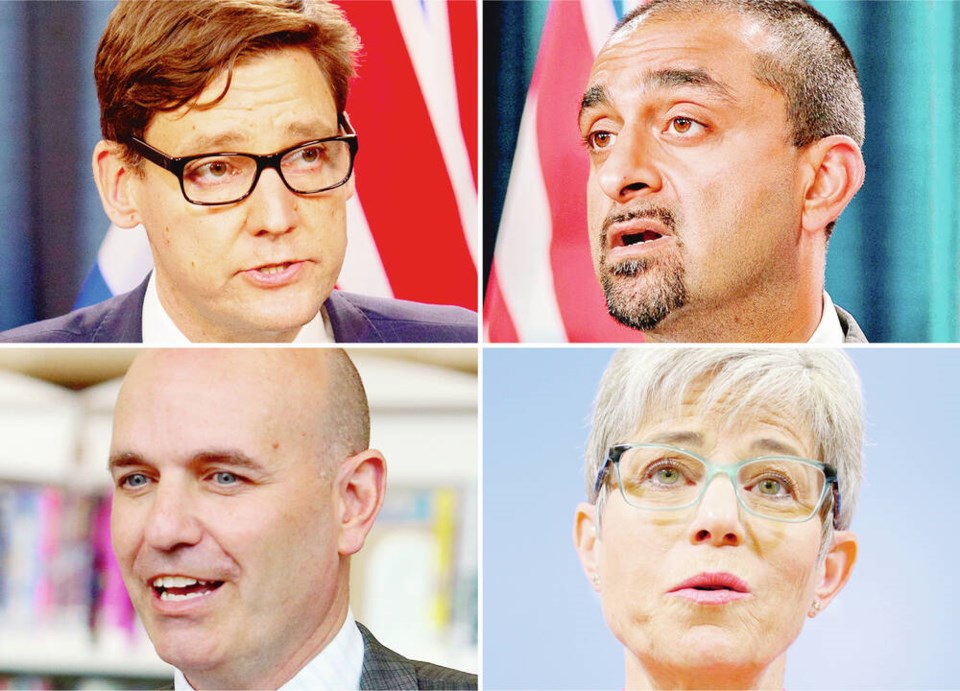The B.C. NDP’s next leader will need to engage both urban and rural voters in the way that popular premiers John Horgan and Christy Clark have done, says a political communication specialist.
Horgan announced Tuesday that he will not run in the next provincial election and expects a leadership race in the fall.
“The NDP is on trend — they’re making gains in places they haven’t before and the issue here is to build and capitalize on that, and part of that is not to abandon the North and the Interior,” said David Black, an associate professor in communication and culture at Royal Roads University.
It takes “high political literacy, great communication skills and a deep political self awareness” to thrive across the province, from Vancouver to the Island, the North and the Interior, said Black.
Names of almost a dozen potential successors to Horgan were being bandied about on Wednesday, including Attorney General David Eby, 44; Jobs Minister Ravi Kahlon, 43; Municipal Affairs Minister Nathan Cullen, 49; and Finance Minister Selina Robinson, 58.
Other potential leadership candidates include Infrastructure Minister Bowinn Ma, 36; Land, Water and Resource Stewardship Minister Josie Osborne, 51; Burnaby-Lougheed MLA overseeing the childcare portfolio Katrina Chen, 38; Health Minister Adrian Dix, 58; Transportation Minister Rob Fleming, 50; and Education Minister Jennifer Whiteside, who said in 2021 she was “north of 50.”
While some have expressed little interest in the position in the past, Black said there is always “arm twisting” in leadership contests — Horgan had to be talked into running for the leadership.
If the party is looking for someone like Horgan with cross-province appeal, it could look to Kahlon, Cullen or Osborne, Black said.
“I’d say those three usually come to mind as answering that criterion — can you replace that winning personality and style that Horgan brought?”
Black said along with issues such as diversity and gender, NDP members will have to assess whether a candidate has the “sharp elbows” to go up against a strong leader such as Liberal Leader Kevin Falcon, “a very competitive political warrior with a history of being a sharp defender of the centre-right perspective.”
Cullen, who ran for the federal leadership in 2012, has a strong NDP identity and is someone who has, like Horgan, been willing to “speak out of turn and isn’t too polished,” said Black. “I don’t know that people such as Dix and Fleming with long party histories are quite as capable of drawing on that sharp edge.”
Dix, a former party leader who lost to Clark in the 2013 election, is experienced and worked well with provincial health officer Bonnie Henry in the response to COVID-19, but Black said his public persona is “a little gentler and a little more cerebral rather than that street fighter” who may be needed.
On the diversity front, Black noted that the history of B.C. premiers is “pretty white and pretty male with the major exception of premier Clark.”
“So you want to have the party open to the likes of Ravi Kahlon or a strong female candidate,” said Black, citing Ma and Whiteside, Chen and Robinson.
Another consideration is that most premiers have hailed from the Lower Mainland and the Island, and members might want to consider underrepresented areas, such as the North, where Cullen serves, he said.
Eby, who before stepping into the provincial ring was executive director of the B.C. Civil Liberties Association and lawyer for Pivot Legal Society in the Downtown Eastside, made his political name by defeating Clark in the Vancouver-Point Grey riding in the 2013 election.
He was named attorney general in 2017 and oversaw the creation of the Cullen Commission inquiry into money laundering, the establishment of the province’s whistleblower protection system and the overhaul of ICBC.
While he has been called the heir apparent by some political observers, Eby has only been in government since 2013. “What it takes to make a great cabinet minister does not translate into being a great leader,” said Black, who called the premier and attorney general roles “apples and oranges.”
Nonetheless, there is space in the race for a new generation, and Eby, being in his 40s, would represent that, said Black. “[Horgan would] like to see someone younger and that’s something that makes sense.”
The party was in the throes Wednesday of considering deadlines for candidate nominations, voting periods and voter eligibility. The B.C. NDP constitution stipulates that members must be in good standing for 90 days to be eligible to vote in any internal elections, including leadership races.
Candidates do not need to be sitting MLAs.
The NDP leadership voting process is one member, one vote.





